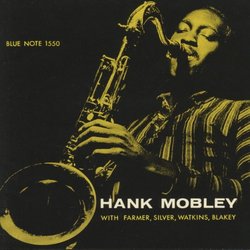Hank Plays his First Blue Note
Todd M. Stellhorn | baltimore, MD | 11/03/2007
(5 out of 5 stars)
"For his first session with Blue Note, as a leader, Hank got a little help from his friends; his friends being in this case none other than the original Jazz Messengers, of Art Blakey fame, minus Kenny Dorham. It was a good call for many reasons, not the least of which being the inherent cohesiveness of a working group, and the security a group of musicians who know each other, and each other's respective sonic styles, offer a first-time leader. In a few short months (this album was cut in March of 1955) Mobley and the rest of the Jazz Messengers would be recorded live at the Cafe Bohemia (11/1955), and the results would be one of the greatest of all live jazz albums, thankfully captured from the frosty, fleeting hand of time by Rudy Van Gelder. And while this album doesn't quite reach those rarefied heights it does have quite a few things going for it. To clarify the differences between the two dates witness "Avil & Tequila", a wonderful Mobley-penned song that is featured on both albums, but that in the foot-to-the-floor energy of it's live version can't be touched by the laidback coolness of the studio take. However there's something to be said for laidback coolness, and that is definitely the tone, and the strength of this quartet session. On the album's highlight: "Walkin' the Fence" Horace Silver starts things off with a pretty, funky (or just plain pretty funky) piano intro afterwhich Mobley slides in with his recognizably round tenor tone and revels in the bluesy glory of his unhurried playing. "My Sin", another Mobley composition (besides Cole Porter's "Love for Sale" all the tunes on this album are Mobley's) is a slow-paced bit of aching musical reflection that finds the young saxophonist exposing his tender side to such effect that one wonders just what the "sin" in question refers to. This song is also interesting in that about ten years later Mobley would revisit it on his 1965 offering "The Turnaround", and though his playing changed in the ten-year interim the one thing that didn't change was the fact that Mobley could still play the @#$% out of a tune, especially one seeped in a meditative fog.
Any review about this session would be remiss without mentioning the beautiful efforts of Hank's illustrious sidemen. Both Art Blakey and Horace Silver would shrewdly claim Mobley for their own groups at different points in a period of time which was much more kind to them, in terms of popular success, than to the largely star-crossed Hank. Silver in particular shines at his rollicking, funky best in this quartet setting, a setting it should be mentioned that Mobley wouldn't return to until his 1960 masterpiece, "Soul Station". Art Blakey is always propulsive, and on "Avil & Tequila" he gets to play around with some nifty latin rhythms. Doug Watkins, a long-time partner of Mobley's, not just in their Messenger days, but also with Donald Byrd ("Byrd's Eyeview", "Byrd in Flight"), and under Watkins own leadership ("Watkins at Large) is so good at jumping into a solid, bouncy groove that one wonders what might have been if his story hadn't abruptly ended in a 1961 car crash (after drugs, the second prolific killer of great jazzmen).
In short this album captures Hank Mobley at the beginning of his musical journey with Blue Note, shortly after leaving Max Roach's group; it's rose-tinted dawn, the sun is starting to smile, and anything is possible. The sadness that would creep into Hank's life is nowhere to be found and in it's place is a vitality that shouldn't be missed or forgotten. Towards the end, after that sun had sadly set, Hank had these lonesome words to say: "It's hard for me to think of what could be and what should have been. I lived with Charlie Parker, Bud Powell, Thelonious Monk; I walked with them up and down the street. I did not know what it meant when I listened to them cry - until it happened to me". This album then is Hank in his early prime, before he knew what it meant to be passed by.
* Note: at the time of this review (2007) this is one hard to find album. I suggest a search on ebay would be your best bet if you're interested. cheers."

